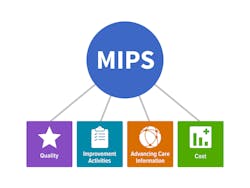The Centers for Medicare & Medicaid Services (CMS) has proposed major policy changes to the Medicare Physician Fee Schedule and Quality Payment Program, with the overarching goal to further reduce clinician burden.
At the core of the proposed policy changes, the agency announced in late July, is a desire to improve the Quality Payment Program (QPP) under MACRA (the Medicare Access and CHIP Reauthorization Act of 2015) by streamlining the program’s requirements. The proposal calls for a simpler way for clinicians to participate in CMS’ pay-for-performance program, the Merit-based Incentive Payment System (MIPS), which is one of two payment tracks within the QPP.
This new framework, called the MIPS Value Pathways (MVPs), beginning in the 2021 performance period, would move MIPS from its current state, which requires clinicians to report on many measures across the multiple performance categories, such as Quality, Cost, Promoting Interoperability and Improvement Activities, to a system in which clinicians will report much less, CMS officials contend.
Under MVPs, clinicians would report on a smaller set of measures that are specialty-specific, outcome-based, and more closely aligned to Alternative Payment Models (APMs). MVPs will connect activities and measures from the four existing MIPS performance categories that are relevant to the population they are caring for a specialty or medical condition, according to CMS.
Per the proposal, “MVPs would utilize sets of measures and activities that incorporate a foundation of promoting interoperability and administrative claims-based population health measures and layered with specialty/condition-specific clinical quality measures to create both more uniformity and simplicity in measure reporting. The MVP framework will also connect quality, cost, and improvement activities performance categories to drive toward value; integrate the voice of patients; and reduce clinician barriers to movement into Advanced APMs.”
The QPP, which started on Jan. 1, 2017, with a “pick-your-pace” program year—which essentially enabled clinicians to avoid payment penalties as long as they submitted at least the minimum amount of quality data—has since ramped up the requirements for participating clinicians. At the same time, CMS continues to exempt certain clinicians who don’t meet a low-volume Medicare threshold. There doesn’t appear to be any change to the low-volume threshold for 2020 in the new proposal.
The proposed rule also suggests changes to how the four performance categories will be weighted for performance years 2020 through 2022. For one, it’s proposed that the Quality category drop from a 40 percent weight in the 2020 performance year to 30 percent in 2022.
CMS is still looking for stakeholder feedback regarding the structure and focus of the MVPs, as well as what other criteria the agency should use to select measures and activities.
One stakeholder group—the Virginia-based AMGA---has already lashed out against the proposal, remarking in a statement that the “estimated program year payment adjustments for 2020 MIPS do not reflect congressional intent or provide reimbursement that is commensurate with the investments that AMGA members made in response to MACRA.”
The AMGA statement took issue that per the MACRA law, providers have the opportunity to earn an adjustment of up to 9 percent on their Medicare Part B payments in 2022 based on their 2020 performance. “However, as indicated in today’s proposal, CMS estimates the overall payment adjustment will be 1.4 percent,” the group said. As such, “AMGA is concerned that MIPS is no longer a transition tool to value-based care, but instead represents a regulatory burden that does not support physician group practices and integrated systems of care that are investing in delivery models based on care coordination and improving population health.”
“We are entering the fourth year of MIPS, and our members expected to have the opportunity to earn a significant payment adjustment if they performed well,” said Jerry Penso, M.D., AMGA president and CEO. “By proposing an overly cautious approach, CMS is not rewarding those organizations that made the necessary investments in and championed value-based care as envisioned by congressional leaders.”
Public comments on the proposed rules were due by September 27.


